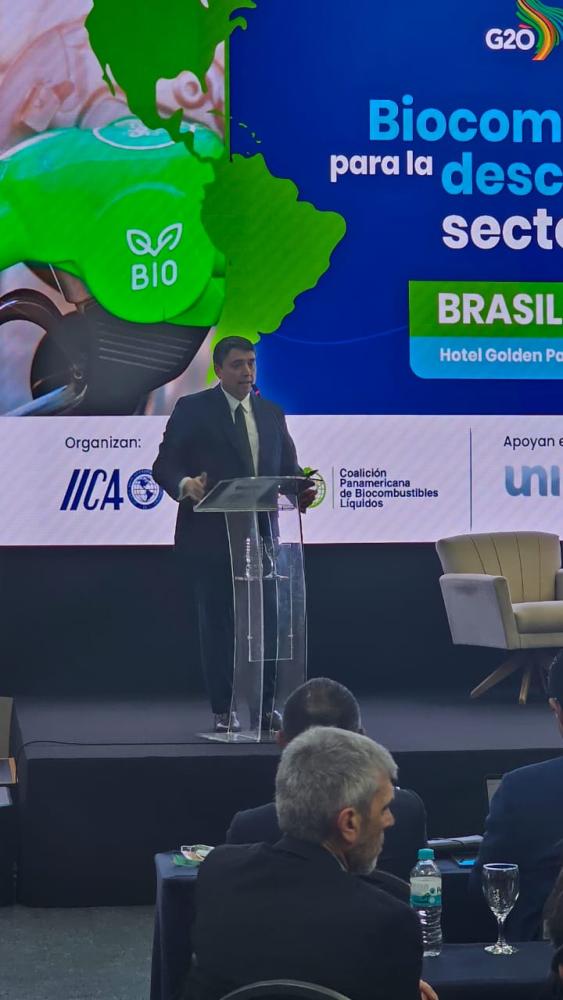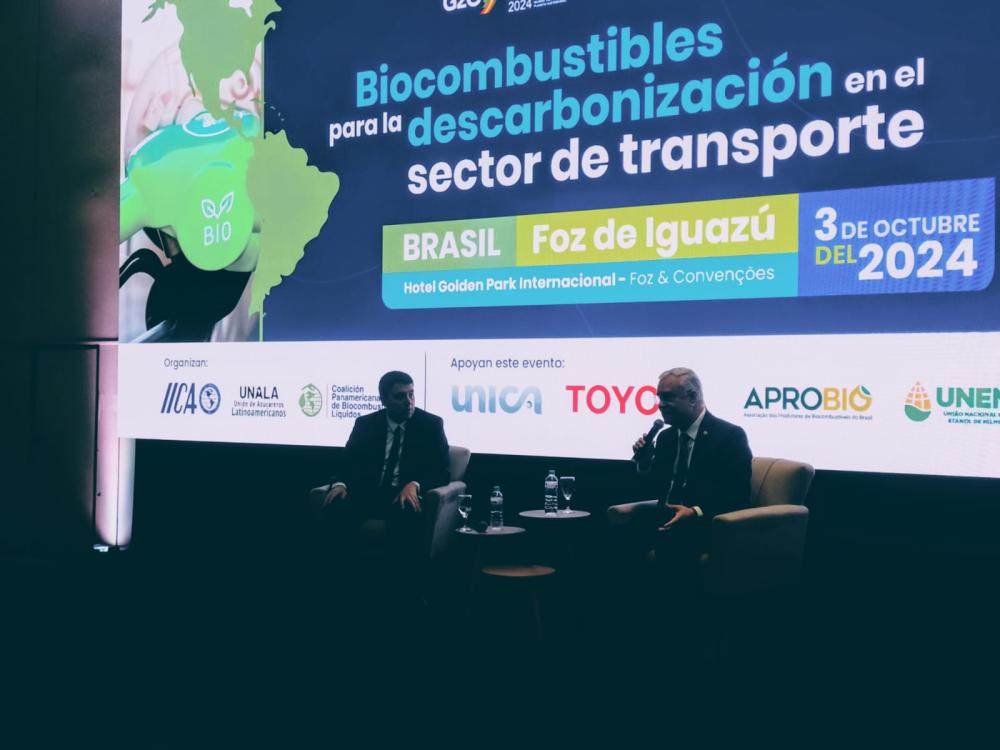Pietro Adamo Sampaio Mendes, Brazil’s Secretary for Petroleum, Natural Gas and Biofuels, explained the decision during an important event organized by IICA, which brought together more than 100 people from the Americas and Asia.

Foz do Iguaçu, 7 October 2024 (IICA). Brazil intends to speed up the decarbonization of the transport sector using liquid biofuels as a tool, and has urged the other Latin American and Caribbean countries to implement a collective strategy aimed at generating economic development in the region and at the same time helping to mitigate climate change.
Pietro Adamo Sampaio Mendes, Brazil’s Secretary for Petroleum, Natural Gas and Biofuels, explained the decision during an important event organized by the Inter-American Institute for Cooperation on Agriculture (IICA) in Foz de Iguazú, which brought together more than 100 people from the Americas and Asia, including businesspeople, processors, officers of chambers of commerce and industry, regulators, and public officials.
The meeting took place within the framework of the G20 meeting of energy ministers focused on the energy transition, which is taking place in this Brazilian city in the Tri-Border Area of Brazil, Argentina and Paraguay.
The aim was to introduce the issue of biofuels as a pivotal element in the energy transition and decarbonization into the transport sector of the G20, a grouping of the world’s largest economies that is also regarded as the biggest forum for international cooperation. Brazil holds the chair of the group this year.
The Association of Latin American Sugar Producers (UNALA) and the Pan American Liquid Biofuels Coalition (CPBIO) organized the event along with IICA, with support from a number of Brazilian organizations (the Association of the Sugarcane and Bioenergy Industry (UNICA), the Association of Biofuel Producers of Brazil (APROBIO), and the National Association of Corn Ethanol Producers (UNEM)) and the Toyota corporation.
The participants emphasized that, given Latin America’s geographical and environmental characteristics and natural capital, liquid biofuels are the region’s best option for replacing fossil fuels and working towards meeting the objectives of the Paris Agreement.
In his presentation at the event, IICA specialist and CPBIO Executive Secretary Agustín Torroba pointed out that Latin American and Asian countries are leading the way in the blending of petroleum-based products with ethanol and biodiesel, while sales of electric vehicles, which today account for 20% of the market, are highly concentrated in China, Europe and the United States.
Fuel of the future
Secretary Sampaio Mendes gave details of the Fuel of the Future Act that Brazil’s Parliament passed recently, which sets out an ambitious decarbonization program based on greater use of liquid biofuels.
The legislation establishes the regulatory framework for increasing the blending of gasoline with sugarcane or corn ethanol up to a maximum of 35%. The new regulations are also designed to spur the use of biodiesel and reduce greenhouse gas emissions in the aviation sector, which will be achieved through the use of sustainable aviation fuels (SAF).
The official announced that Brazil’s President, Lula da Silva, would be signing the bill into law on October 8.

Sampaio Mendes explained that for a country like Brazil, the large-scale electrification of transport is not the best option for achieving emission reduction goals, because the long distances involved would require enormous investment and the use of large batteries.
He suggested that the huge growth in ethanol and biodiesel production in Brazil showed the enormous potential of the biomass available and the major comparative advantages of biofuels.
“It is no secret that there is unjustified resistance from countries in the northern hemisphere, which do not have the land and climatic conditions that we have to produce biomass, and that is why they oppose bioenergy as an alternative for the decarbonization of transport,” he said.
He called on all countries in the region to work together to defend their interests in the same way that nations in other regions do.
“In Brazil, we have the necessary technical expertise and public policies, and meet the quality requirements; we stand ready to share all our experience in ethanol production with other countries in Latin America and the Caribbean. There is a space for dialogue that we can promote,” the minister remarked.
Sampaio called on the region to defend its own interests. “We must not allow other regions of the world to try to export solutions to the climate crisis without understanding our local conditions, which give us enormous advantages for biomass production. In Latin America and the Caribbean, we have to act as a bloc to share experiences and defend our interests,” he emphasized.
“We must invest in our technological model,” he concluded. “We have extremely competitive conditions for the production of biofuels and we need to act together and cooperate with each other, instead of competing. The global challenge of reducing greenhouse gas emissions and mitigating climate change is enormous, and our region can make a key contribution with biofuels.”
More information:
Institutional Communication Division.
comunicacion.institucional@iica.int











